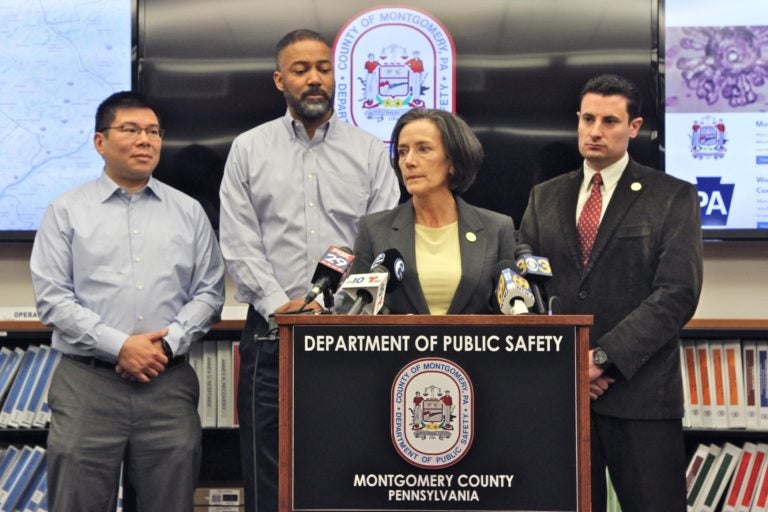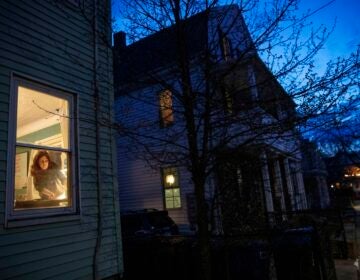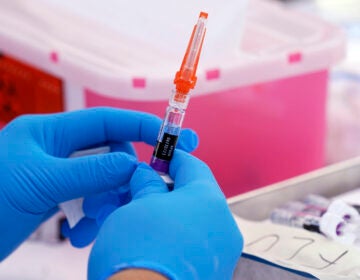Privacy vs. public health: How Pa. and N.J. weigh disclosing coronavirus patient details
Authorities try to balance patient privacy with public health and safety.

File photo: Valerie Arkoosh, chair of the Montgomery County Board of Commissioners. (Ximena Conde/WHYY)
Updated 2 p.m. Wednesday, March 11
The information the public knows about emerging coronavirus cases can vary county by county, state to state — and people living in areas getting fewer details may worry their health is at risk.
In New Jersey, the public knows the age of the presumptive coronavirus patients, the municipality in which they live, and the hospitals where they’ve been admitted.
The information available to Pennsylvanians about the cases within the state is more limited and varies in detail. As a general rule, the state has revealed only the counties where cases crop up and how patients acquired the virus, leaving it up to county health officials to disclose hometowns, should they need to.
Differences in disclosure approaches have prompted a conversation between residents and health officials that weighs the needs of the public against patients’ rights to keep their health information confidential.
Disclosing the municipality where a patient lives can offer one major benefit: It can comfort the “worried-well,” said Krys Johnson, an assistant professor at Temple University’s Department of Epidemiology and Biostatistics.
People who don’t present symptoms, but might be hypervigilant about their health and want a coronavirus test anyway, are put at ease knowing the town where the patient lives, Johnson said.
“They’re kind of limiting the amount of points of contact and saying, ‘OK, just because you were in the same county as this case doesn’t mean that you can be tested,’” she said.
The information is also vague enough that it doesn’t “out” a patient, which can prevent other people presenting symptoms from coming forward. “That’s something that we do frequently in public health,” Johnson said. “We give just enough information to be descriptive, but not to be able to identify people.”
Keeping patient information confidential is especially important when the illness is stigmatized, as is the case with COVID-19, Johnson said.
In Pennsylvania, patients have the added protection afforded by the Disease Prevention and Control Act, which tasks local health departments with preventing the spread of communicable diseases but requires that a patient’s information be kept largely confidential.
“The department is following that act, and providing what information is necessary to protect the public health of Pennsylvanians, while also protecting the right to privacy for those individuals who are presumed positive cases,” said Nate Wardle, a spokesman for the Pennsylvania Department of Health.
Which case details are made public is based on how thoroughly health officials can track down the people the patient may have come into contact with while sick.
“For somebody who has a workplace [where] everybody can be tracked as to who they came into contact with and contact tracing can occur, we would see no reason to disclose information that could lead to revealing the patient,” Wardle said.
That was the case with Delaware County, which does not have its own health department and has not revealed the hometown of its only patient to date to test presumptively positive for the virus. Despite the fact that the woman in question was isolated at home, the failure to reveal her location drew calls for transparency from two state senators.
But Jeffrey Kahn, director of the Johns Hopkins Berman Institute of Bioethics, worries that states are divulging too much. He said he doesn’t see the need in cases where there has been limited exposure to the healthy population.
“Generally speaking, we know we don’t publicize that a person with syphilis was in ‘X Township’ in Pennsylvania or New Jersey,” he said. “That information is not shared publicly.”
Still, there are cases in which officials are forced to reveal very specific details about a patient.
“If we cannot track down all of the people who could have come into contact with this person — either they were in a public place or we can’t determine from either themselves or their family who they would have come into contact with — then there is a need to provide that information publicly to make the public aware,” said the Pennsylvania Health Department’s Wardle.
Such seems to have been the case in Montgomery County Monday.
Citing information released earlier by Children’s Hospital of Philadelphia, Valerie Arkoosh, chair of the Montgomery County Board of Commissioners, said at a news briefing that a CHOP cardiologist who had been working in King of Prussia was a presumptive positive for the coronavirus. The doctor had been admitted to the Hospital of the University of Pennsylvania.
The public announcement supplemented the contract tracing work CHOP was doing with staff and families with whom the doctor may have been in contact.
Efforts to reach anyone who could have been exposed to the virus through the doctor led
the Lower Merion School District and the Hatboro-Horsham School District’s Simmons Elementary to cancel classes Tuesday for deep cleaning. It was found that students there had come into contact with the doctor in question during a visit to CHOP’s King of Prussia facility.
Though that very public form of contact tracing is sometimes necessary to prevent outbreaks from spreading, Kahn said he worries states are divulging too much — specifically when reporting where patients are being treated.
Other than making a public announcement when contact tracing has become too cumbersome for health officials to do discreetly, Kahn said he doesn’t see the public health benefit in disclosing where people are being treated.
“It will absolutely tamp down people’s willingness to go to clinicians because they don’t want to be outed,” he said. “There’s a long history of why we treat infectious diseases the way we have.”
Still, people like Johnson, the Temple epidemiologist, suspect that as contact tracing becomes harder to do, more details about where patients may have exposed other members of the public will become more common, and possibly make those patients easier to identify.
—
This article has been updated to clarify how information about a Montgomery County coronavirus case was made public.
WHYY is your source for fact-based, in-depth journalism and information. As a nonprofit organization, we rely on financial support from readers like you. Please give today.


![CoronavirusPandemic_1024x512[1]](https://whyy.org/wp-content/uploads/2020/03/CoronavirusPandemic_1024x5121-300x150.jpg)



